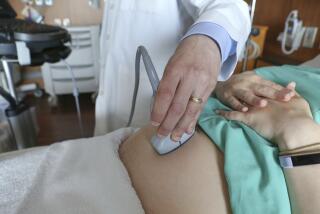Test All Newborn for AIDS, Scientific Council Advises
- Share via
WASHINGTON — The federal government should anonymously test for AIDS antibodies every baby born in the United States as part of a greatly expanded effort to track the transmission of the disease, a committee of prominent scientists and medical authorities recommended Wednesday.
The National Research Council--an affiliate of the prestigious National Academy of Sciences, a congressionally chartered, private organization that advises the federal government on matters of science and technology--also urged in a report that similar anonymous data be gathered from women who are clients of abortion clinics and from all laboratories in the country that are now conducting AIDS testing.
“Without better information on the prevalence of HIV (Human Immunodeficiency Virus) infection, the nation will be unable to prepare adequately for future demands for hospital beds and other health care services,” the report said. “Without better data, scientists and the American public can anticipate endless debates about whether the disease is spreading ‘rapidly’ or ‘slowly.’ ”
Such recommendations do not have the force of law, but they carry considerable weight among policy-makers. The new proposal, however, is likely to draw the same kind of widespread criticism as suggestions several years ago by federal health officials that all hospital patients and all couples applying for marriage licenses be tested.
Many in the public health community opposed the idea, arguing that the resources used to conduct the testing would not justify the small number of people found to be infected. Further, they said, the money could better be spent on AIDS education, counseling and expanded testing of populations at risk.
“The technique of doing anonymous studies among newborns is a valuable one, but it doesn’t make sense to do it on a universal basis in areas where you know from other data that there is a very low incidence of infection,” said Carol Levine, a medical ethicist who is currently executive director of the Citizens Commission on AIDS for New York City and Northern New Jersey. “It’s like throwing a net into the ocean--where you know the fish aren’t.”
Calls Proposal Inexpensive
But Charles Turner, staff director for the committee, said in an interview that testing the newborn would be “relatively inexpensive,” since “blood is already drawn from the children” for other medical tests, and would provide “definitive data” on the spread of infection among “an important segment of the sexually active population--young women who are bearing children.”
Because the newborn carry the antibodies of their mothers, testing for AIDS antibodies in infants would accurately reflect the mothers’ infection status.
Such a program “will tell you in advance when the infection begins to move into communities where you didn’t anticipate it,” Turner said. “That’s extra important, because we want to know in a reliable way when the patterns of infection change.”
Panel Chairman Lincoln E. Moses, head of the statistics department at Stanford University, said that the proposal to test all newborn infants would not provide that mothers be told of test results, because fear of such tests might encourage some women to avoid hospital deliveries.
44 States Involved in Tests
Chuck Fallis, spokesman for the federal Centers for Disease Control, said that 44 states already perform--or are planning to perform--anonymous testing of the newborn. CDC guidelines call for the testing of at least 25% of the newborn. He said if more funding is available, the ultimate goal is to test all babies nationwide.
The panel stressed that the government, in the context of conducting such studies, should also “vigorously pursue” three safeguards to protect against violations of confidentiality, including “legal penalties in the event confidentiality is breached, legal protection against discrimination based on HIV status and anonymous testing so that the identify of the (person providing the blood) is neither known nor traceable. . . . “
Currently, the CDC is conducting several anonymous surveys of AIDS infection in selected populations--including clients of sexually transmitted disease clinics, hospitals, the newborn, and drug treatment centers--to determine the extent of AIDS infection. But the panel said that such “purposive selection . . . compromises the usefulness of the data” because accurate conclusions cannot be drawn about each specific population.
Thus, the committee recommended that federal health officials redesign these surveys as “probability samples” to include more individuals in each specific population, and said that studying all newborn infants, rather than a selected few, would make the survey “free of many kinds of biases.”
The panel also recommended that the federal government sponsor “vigorous” programs of basic social and behavioral research to obtain more information about sexual habits--particularly male homosexuality--as well as monogamy in U.S. relationships, the sexual behavior of divorced persons, prostitution and frequency of condom use. Current information, the committee said, is “fragmentary” and data on male homosexuality “dates from the 1940s, was collected by flawed sampling schemes and is not an adequate base for current predictions.”
Noting that existing evidence does suggest that teen-agers are increasingly experimenting with sexual behavior, the committee recommended that AIDS information be taught in schools using “explicit information” and that condoms “be freely available to all sexually active persons.”
Calling intravenous drug users “one of the fastest-growing components” of the epidemic, the panel also called for “well-designed” trials of sterile needle programs, such as those proposed in a 1986 National Academy of Sciences report.
More to Read
Sign up for Essential California
The most important California stories and recommendations in your inbox every morning.
You may occasionally receive promotional content from the Los Angeles Times.












